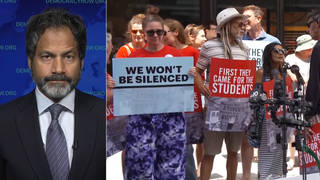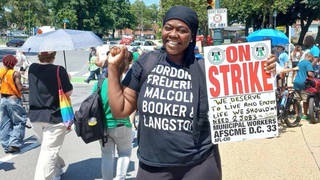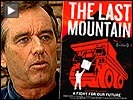
Guests
- Jeff Biggersjournalist and cultural historian. His new book is Reckoning at Eagle Creek: The Secret Legacy of Coal in the Heartland. He is author of several other books, including The United States of Appalachia.
On the heels of President Obama’s major initiative to develop so-called clean coal technology, the journalist and cultural historian Jeff Biggers explores the myth of clean coal in a new book on the secret history of coal mining in Obama’s home state of Illinois. Jeff Biggers’ family has lived in southern Illinois for 200 years. In 1999, their 150-year-old log cabin and 200-year-old settlement at Eagle Creek was destroyed by several strip-mining operations. [includes rush transcript]
Transcript
AMY GOODMAN:
Over the past two weeks, we’ve examined the Obama administration’s push to develop a new generation of nuclear power plants. Last week, Obama pledged $8.3 billion in loan guarantees needed to build the nation’s first nuclear reactors in nearly three decades.
But this is not the only controversial energy project being promoted by the White House. Earlier this month, Obama announced a major initiative to develop so-called clean coal technology.
PRESIDENT BARACK OBAMA: The United States is the Saudi Arabia of coal. And that’s because, as I said, it’s one of our most abundant energy resources. If we can develop the technology to capture the carbon pollution released by coal, it can create jobs and provide energy well into the future. So, today, I’m announcing a carbon capture and storage taskforce that will be charged with the goal of figuring out how we can deploy affordable clean coal technology on a widespread scale within ten years. And we want to get up ten commercial demonstration projects, get those up and running by 2016.
AMY GOODMAN:
President Obama went on to acknowledge there’s some skepticism about if coal can ever be clean. He didn’t mention that advocates of coal mining have been pushing so-called clean coal schemes for over a century.
The journalist and cultural historian Jeff Biggers explores the myth of clean coal in a new book on the secret history of coal mining in the President’s home state of Illinois. Jeff Biggers’ family has lived in southern Illinois for 200 years. In 1999, his family’s 150-year-old log cabin and 200-year-old settlement at Eagle Creek was destroyed by several strip-mining operations. In a moment, Jeff Biggers will join us in the studio, but first we turn to a short video produced to promote his book Reckoning at Eagle Creek: The Secret Legacy of Coal in the Heartland.
JEFF BIGGERS:
I stood with my mother and uncle at the rim of lunar expanse. It looked like an earthquake had devastated the area. A coal mining company had bought most of the holler where my family had lived for two centuries, along Eagle Creek and the Shawnee National Forest in southern Illinois, and blasted away the old home place.
You see, my granddaddy had been a coal miner, but this work now was the dominion of anonymous heavy equipment operators, who plowed the wound of the strip pits into scabs and then just disappeared. The more I stood at the abyss of this strip mine and watched the frenetic pace of the bulldozers, the more I became convinced I had stumbled onto the scene of a crime in Eagle Creek.
We had literally stripped away the most troubling issues of the coal industry from our historical memory. We never discussed the fact that Native Americans, such as the Shawnee in our hollers, had been removed as part of a national policy by Thomas Jefferson, or that the first coal industry in the land of Lincoln and Obama had been launched with legal black slaves, or that the environmental havoc unleashed by strip mining had not only poisoned some of our most diverse forest and waterways in the heartland, but also wiped out our families.
Coal had created a stunning anatomy of denial in every generation, including today. “Clean coal” was simply another motto that had been peddled in Chicago since 1895. At the crossroads of the great American experience here in the Saudi Arabia of coal, we were hiding a 200-year-old secret legacy of coal in the American heartland, a legacy that started with Eagle Creek.
AMY GOODMAN:
The journalist and cultural historian Jeff Biggers, joining us here in New York. His new book, Reckoning at Eagle Creek: The Secret Legacy of Coal in the Heartland.
We welcome you to Democracy Now! And thank you for walking the hour in New York, walking through the snowy streets. But you made it.
JEFF BIGGERS:
The gentle, beautiful streets of New York. It’s great to be back.
AMY GOODMAN:
Well, this is quite a tour de force, Reckoning at Eagle Creek.
JEFF BIGGERS:
Thank you.
AMY GOODMAN:
Take off from where you were speaking in the video, about the significance of coal, and what you heard just before, and that is President Obama talking about coal as — and the United States as the Saudi Arabia of coal and the potential he says that represents.
JEFF BIGGERS:
You know, my prologue is called “Welcome to the Saudi Arabia of Coal, Mr. President.” And I think it’s really one of the saddest scandals we have in our country, that any discussion about so-called clean coal never includes the staggering human and environmental cost. You know, a young man in the 1890s named Francis Peabody, a young coal peddler — of course, went on to create the world’s biggest coal company — was taking out ads for clean coal, smoke-free clean coal, in the Chicago Daily Tribune in the 1890s. And for the past century we’ve had to deal with this incredible scandal, these outrageous egregious human rights violations, the nightmare of the coal industry in the coalfields of America. And I think that is a reckoning our president needs to have, as the rest of the nation, of the dirty and the deadly reality of our coal policy.
AMY GOODMAN:
Well, talk. Tell us that history. Give us a thumbnail sketch.
JEFF BIGGERS:
Sure. You know, what I found out was the decisions today to allow the coal industry to operate, in whatever cost it takes to get that coal, at whatever expense — you know, we know, of course, about mountaintop removal in Appalachia. But the rape of Appalachia, as Harry Caudill wrote in his great classic Night Comes to the Cumberlands, actually came from Illinois, in my neck of the woods, that we’ve been dealing with strip mining since the 1850s.
But Amy, if you go all the way back, when I looked at this amphitheater of death in my family, this massive strip mining thing that destroyed one of the most diverse forests in our nation in the heartland, I realized that our coal mining policies go all the way back to the removal of Native Americans, that we never talk about, with Thomas Jefferson. It goes back to legal slavery. Here we are in Black History Month, and no one ever talks about the fact that the coal industry, like the vicious tobacco industry, began with black slaves. And that stretched into Illinois. Even in the land of Lincoln, we had legal slavery working in the coal mines. And it was my people, in the backwoods, who was running the anti-slavery movement to stop it.
And for the next century and a half, we’ve been having to stand up to big coal, as well, through our workplace safety movements with the unions, of course — and Mother Jones is buried in southern Illinois — to now our incredible environmental movements, to now having to stop these horrible coal-fired plants, and of course the new bridge to nowhere, with the FutureGen carbon capture and storage plant.
AMY GOODMAN:
Talk more about Eagle Creek.
JEFF BIGGERS:
Eagle Creek is all the way tucked into the southeastern corner of Illinois. You know, the Wisconsin glaciers didn’t arrive to this part of Illinois. We think of Illinois as Chicago and corn. But the bottom third are these wonderful, gorgeous Shawnee Hills. It’s the bridge between the Cumberlands and the Ozarks. And there was the earliest crossroads of the American culture. It’s where everybody was going to the West to discover the outside territories, the Northwest Territories.
And here my people came in, in the 1800s, literally in 1805, as some of the earliest people, part of a woodland culture from Appalachia. And this kind of woodland culture was very related to the land. It was a culture that understood the diversity of the area, that understood that we could make a living throughout the region.
Unfortunately, our property sat on five seams of coal. So when they created the Illinois Wilderness Act, which protected everywhere in this region where my family lived, there was a little loophole, because we had five seams of coal, and they pulled out a million tons of coal from our homestead, our historic homestead, enough to power America for four-and-a-half hours. That was the cost of 200 years of incredible history in our heritage.
AMY GOODMAN:
The Native Americans and the history of coal?
JEFF BIGGERS:
You know, Thomas Jefferson went off to England, of course, in the 1780s and ‘90s, and he realized when he saw the steam-power shovel and the discoveries of James Watt that just that little peck of coal could do more work than a horse. And so, he came back, and he really accelerated our earliest coal industry, of course with African slaves.
But the problem was, these stones of fire, this coal, was sitting underneath all these Native Americans in the Ohio River Valley and of course in Appalachia. He sent Lewis and Clark West, not simply to discover the West, but to make a record of the coal deposits. And in fact, Captain Lewis said, “Oh, my god, in southern Illinois, these are some of the richest coal we’ve found.” And, of course, it was African slaves who were loading those barges. And it was the Shawnee Indians who were living there. And Jefferson, unfortunately — and Jefferson is one of my great heroes, of course — began this horrible policy that eventually resulted into the Indian Removal Act with Andrew Jackson, to literally remove the natives in order to get to the great resources of salt and coal.
AMY GOODMAN:
Jeff, I wanted to ask you about the ongoing resistance, mountaintop removal in West Virginia. Last month, activists took part in a tree-sit and stopped Massey Energy from mining on Coal River Mountain. We spoke to one of the tree sitters, Eric Blevins, on Democracy Now!
ERIC BLEVINS: Right now I am sitting on a platform that is hanging in a tree, attached to the tree, probably about sixty or seventy feet in the air. I’m not sure exactly. Fifty yards away or so, there’s a bunch of holes where Massey Energy has been drilling to put explosives so they can blow up Coal River Mountain, the last mountain in the Coal River Valley area of West Virginia that has not been destroyed by mountaintop removal. And they actually just started blasting on the mountain within the past year.
AMY GOODMAN:
Can you comment on what they’re doing in West Virginia and Massey Energy?
JEFF BIGGERS:
You know, the folks in the coalfields are literally fed up. And so, now we have this incredible national movement that’s been going on that draws on a longtime movement, of course. We’ve been trying to stop strip mining for decades. And they believe that we have to go to the extent of civil disobedience literally to stop the mountaintop removal, the explosions, the detonation, near one of the largest coal slurry impoundments in the hemisphere, that this is symbolic, Amy, of what’s happening.
We have an administration, the Obama administration, like we’ve had for 200 years, who feels like they can regulate and outlaw industry. And instead of abolishing mountaintop removal, which only supplies seven to eight percent of our national coal production — we literally don’t need it; we’ve had stockpiles of coal for the first time in twenty-five years in the summer — we’re going through with one of the most reckless, egregious human rights and environmental violations in our country. And to me, it’s symbolic of what happened at Eagle Creek, that the commerce and the profits of outside companies have always been weighed before the common good of the people and the protection of the land.
AMY GOODMAN:
Jeff, tonight you’re going to be speaking, if people make it out and carve themselves out of the snow, at the Harlem Arts Salon over 1925 Seventh Avenue, between 116th and 117th, about the coal roots of Black History Month. In these last minutes we have together, talk about what you will be saying, on these last days of Black History Month, the significance of coal.
JEFF BIGGERS:
Certainly. You know, I didn’t just write a book about the dark legacy of the coal industry. I also wrote a book about this incredible legacy of resilience and resistance, that my people have stood up against the coal companies for 200 years, that the abuse of the land has always gone hand-in-hand with the abuse of the people.
And my grandfather, as a coal miner, always reminded me that the United Mine Workers, that he was part of, was always integrated from day one. My grandfather was very proud of the fact that white and black miners worked together. And he reminded me that, of course, Black History Month was founded by Carter Woodson, the great historian from Howard University who had worked as a coal miner in West Virginia, and there he heard these incredible stories of African American miners. And then he went on to study, of course, at Harvard, and he wrote his dissertation on African slavery in Appalachia. But he wanted to have a Negro History Week, which he created for the Journal of Negro History, what of course evolved into Black History month.
And it’s that resiliency, Amy, that I want to talk about, that my backwoods people were not only part of the anti-slavery movement to stop slavery, but also to stop the machinations of the coal industry. You know, just as my grandfather fought with his black lung to have better benefits as coal miners, we’re trying to fight and preserve our culture and our contributions. And so, Black History Month, as part of its coal roots, to me, is really one of the great stories of what has come out and emerged from this tension in the coalfields.
AMY GOODMAN:
And the slaves that were sent into the mines, talk about that.
JEFF BIGGERS:
You know, it was a horrific policy. One of the great philosophers from France came to visit Thomas Jefferson, and he couldn’t believe it. He said, “Thomas Jefferson, you have these slaves with harnesses around their neck and harnesses around their waist.” And they were being used as human bulldozers to move almost thirty feet of overburden, that they would go into these deep pits, like the Dover pits in Virginia, and die like flies. We lost so many people. It was untold numbers.
And then, finally, we liberated Richmond in Virginia and parts of West Virginia during the Civil War. Thousands of African and African American coal miners climbed out of these mines and ran away and never came back. Unfortunately, those same abuses, the same sort of homicidal negligence in the coal industry, continued with my grandfather, and that’s why we have this very fervent union movement today.
AMY GOODMAN:
I want to thank you, Jeff, for coming in on this snowy day, but most importantly for writing Reckoning at Eagle Creek and continuing to alert us about what’s happening in coal country. Jeff Biggers’ book is Reckoning at Eagle Creek: The Secret Legacy of Coal in the Heartland. And we’ll post on our website again where the Harlem Arts Salon is, where he’ll be speaking tonight at 7:00.













Media Options